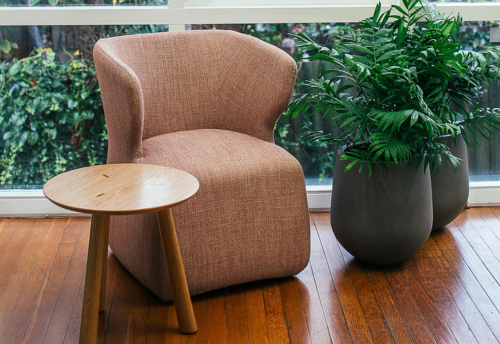10 Eco-Friendly Flooring Options: Step into a Greener Home
24th Aug 2022
As a homeowner, you want to make your home the best place it can be. And with climate change affecting everyone, including homeowners, it's essential to consider more eco-friendly options when updating your house. From painting with zero-VOC paint to installing solar panels, another green home update to consider is eco-friendly flooring.
Carpet & Flooring Online was recently featured in the Redfin article '10 Eco-Friendly Flooring Options: Step into a Greener Home.' You can read the full article over the on the Redfin blog, or take inspiration from the key takeaways below.
Here's 10 eco-friendly flooring options to consider in place of traditional flooring.
What is green flooring?
Green or eco-friendly flooring is much more than just flooring made from natural, recycled, or renewable materials. It also takes into consideration the flooring material's long-term impact on the environment at large. Some factors that help determine if the flooring is sustainable include:
- its ability to be recycled and renewed
- whether it was responsibly manufactured
- the distance and cost of transportation
- how much maintenance it will need over time
- and its durability and lifespan
10 eco-friendly flooring options
1) Bamboo flooring
One of the most well-known sustainable flooring options is bamboo flooring. Bamboo comes from the bamboo plant, a grass that regrows every three to five years. This harvest cycle is significantly quicker than a tree's harvest cycle, which is upwards of 20 years. Bamboo flooring has many similarities to hardwood flooring and is easy to install and maintain. One point to note is that most bamboo is produced in the Pacific, meaning it can create more environmental pollution the farther it’s transported.
2) Cork flooring
Cork is often associated with wine bottles or maybe as a wall treatment, but it's a great sustainable flooring option too. Cork flooring is harvested from the bark of the cork oak tree. Typically these trees are cut down, and after three years, they grow back. Cork floors are a rather durable option as they can last anywhere from 10-30 years. They also have some anti-microbial properties, can act as an insect repellant to bugs and mites, provides insulation, are fire-retardant, and are easily maintained.
3) Linoleum flooring
Linoleum is another natural flooring option to consider. Linoleum flooring is created by combining linseed oil, wood flour, cork dust, and other natural materials. The linseed oil is derived from flax plants, a renewable and widely available material. Linoleum is very durable and can last around 20 years. Like cork, it is also fire-retardant.
4) Eco-friendly carpeting
Traditional carpet is not a sustainable flooring option for several reasons. It’s often made from petroleum which is a non-renewable resource. Additionally, carpet is often produced with toxins and volatile organic compounds (VOCs).
When choosing eco-friendly carpets, Carpet & Flooring Online suggests, “Opt for carpets made from a natural material, over man-made carpets (such as polypropylene), which are more harmful to the environment. 100% wool carpets will last for decades and have natural dirt-repellent properties. Sisal, jute, and seagrass are also popular natural materials for carpets, which add texture and rustic appeal to your home.”
Wool: Wool carpet is made from natural resources, turned into thread, and woven into carpet. Many wool carpets can last hundreds of years, making them very sustainable.
Jute: A plant-based version of wool is jute. It can be spun into a thread and woven into a sustainable carpet.
P.E.T. Berber: Polyethylene terephthalate (P.E.T.) Berber is a carpet made of recycled plastic bottles, which is another renewable option to consider. It’s a durable carpet option that is relatively spill resistant and comes in a variety of colours and options. One con of P.E.T. Berber is that it’s prone to snagging and can unravel if not repaired.
5) Recycled glass tile flooring
Recycled glass tiles are a unique way to spruce up your bathroom or shower flooring. They are a great alternative flooring option, made from recycled materials like broken windows and recycled beer and wine bottles. Recycled glass tile flooring also survives well in damp environments and doesn't mould easily.
6) Reclaimed hardwood flooring
Hardwood flooring is one of the most popular flooring options out there. However, traditional solid hardwood flooring isn't very sustainable due to deforestation concerns.
So when choosing sustainable hardwood floors, make sure they are FSC certified. These hardwood floors have been certified by the Forest Stewardship Council, meaning they have met sustainability standards. Engineered wood flooring is also a far more sustainable option over solid wood flooring, since it utilises premium wood in the top layer only, as opposed to through the depth of the entire plank, which is effectively never seen.
Another option is to consider a reclaimed wood floor, which is made from reused or recycled wood found in older buildings or leftover from projects. This is an eco-friendly option as it prevents new wood from being harvested.
7) Concrete flooring
At first, concrete may sound like it belongs in an industrial warehouse and not a home. But concrete flooring can be one of the best eco-friendly options on the market. When polished and stained, concrete can rival even the most aesthetic flooring options. It’s extremely durable and likely doesn't need replacing, making it a very cost-effective choice.
8) Stone flooring
Stone is another popular environmentally friendly flooring choice. The earth constantly recreates stone, meaning it's a natural product. Stone can also be recycled for other flooring options or household projects. Keep in mind that it’s more costly to ship, meaning that it can contribute to pollution if the stone flooring is sourced from another state or country.
9) Rubber (recycled) flooring
Rubber may seem like an unlikely flooring option, but it is a great way to use recycled materials in your flooring project. Created from recycled tires, rubber flooring is water-resistant and highly durable.
10) Recycled metal flooring
Another unlikely eco-friendly flooring option is recycled metal. They are made from scrap pieces of aluminium, brass, or copper and prevent these materials from ending up in landfills. However, this flooring option can be quite expensive compared to the other options.
Originally published by Redfin
For further advice on eco-friendly flooring options, feel free to give our friendly team a call on 01905 954045 to discuss your requirements and the best flooring to suit your needs.


